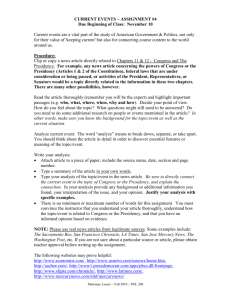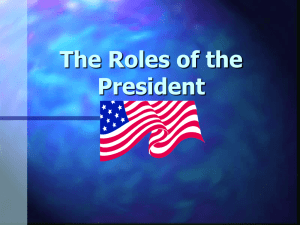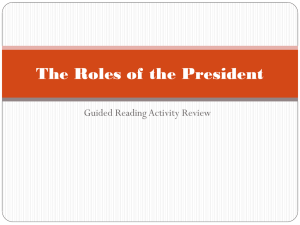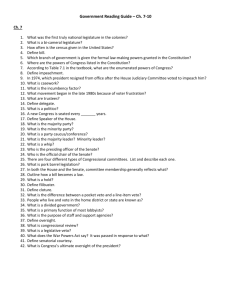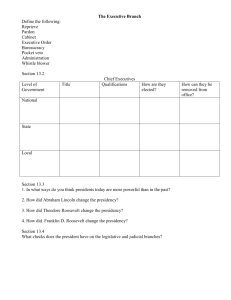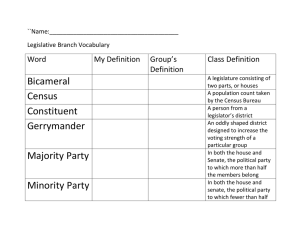A Survey of USA
advertisement
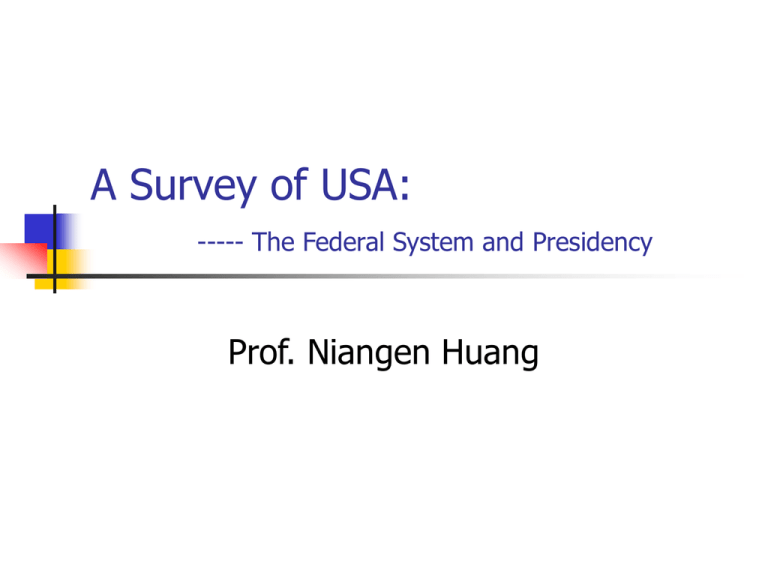
A Survey of USA: ----- The Federal System and Presidency Prof. Niangen Huang The Federal System and Presidency 1. What is federalism? 2. What is the separation of powers? 3. What is the constitutional power of the American president? 4. How do you understand that President holds big influence in law-making? 5. How is the president's power limited? The Federal System and Presidency The political system of the United States is established on the basis of the three main principles: federalism the separation of powers respect for the constitution and the rule of law. According to the U.S. Constitution, neither the central nor the state government receives its powers from the other; both derive them from a common source, a constitution. The Federal System and Presidency The national government has only those powers, with the one important exception of foreign affairs, delegated to it by the Constitution. “The states have the powers not delegated to the central government except those denied to them by the Constitution and the constitutions of their states.” This division of powers by a constitution between the central government and state governments is called federalism. It should be observed that federalism operates only on two levels, the national and the state. Units of government within a state enjoy no independent existence. The Federal System and Presidency Separation of powers means constitutional division of power among legislative, executive, and judicial branches. This principle means more than allocating legislative power to the Congress, executive power to the President, and judicial power to the Federal Courts. It also means giving each branch constitutional and political independence, and checks and balances that allow the various branches to delay or block the actions of the other branches. This is the supreme creation of the framers in 1787 and it has become a lasting and central part of the American political system. The Federal System and Presidency "This Constitution, and the laws of the United States which shall be made in pursuance thereof; and all treaties made, or which shall be made, under the authority of the United States, shall, be the supreme law of the land,…" (Constitution, Art. VI ) Every American citizen is required to respect the Constitution and to obey the laws of the United States. The citizen who disapproves of a particular law can legally and peacefully strive for its change through participation in government, that is, through voting or communicating with the representatives. The Federal System and Presidency According to the Constitution, the executive power is allocated to the President. As Chief Executive, he is given the authority or duty to command the armed forces, to grant pardons, to make appointments to certain offices (with the approval of the Senate), to conclude treaties (with the concurrence of two-thirds of the Senate), to send and receive diplomatic and consular officials, to inform Congress on the "state of the Union" to recommend legislation, approve or veto bills passed by Congress, and "take care that the laws be faithfully executed. " The Federal System and Presidency The President, as Commander-in-Chief, has the power to raise train, supervise, and deploy American armed forces. The President has no power to declare war. The Constitution clearly confers upon Congress the power to declare war. In reality, many presidents have waged wars without congressional approval, and some created situations that left Congress little choice. For example, President Johnson and Nixon waged wars in Vietnam and Cambodia without formal declarations by Congress. The Federal System and Presidency No chief executive could properly be held responsible for his administration who lacks the authority to appoint his principal subordinates. The framers of the Constitution gave recognition to this fact in a provision of Article II, which reads as follows, the president " shall nominate, and by and with the advice and consent of the Senate, shall appoint ambassadors, other public ministers and consuls, judges of the Supreme Court and other officers of the United States.” Although the Senate has equal authority "to advise and consent" in respect to any nomination the president may make, the Senate usually gives the president a relatively free hand. Even if the opposing party controls the Senate, the president's nominations are usually accepted. The Federal System and Presidency The president carries the major responsibility for foreign policy. His constitutional authority is as follows: (1) He is the nation's sole official spokesman (hut usually through diplomatic channels) with the foreign powers. (2) He sends and receives ambassadors and ministers. It is primarily through this authority that he recognizes new foreign governments and states. (3) He appoints, with the consent of the Senate, the Secretary of State, all other officers of the State Department, and ambassadors, ministers, and special agents. (4)I with the consent of two-thirds of the Senate, he makes treaties and often on his oven authority, he makes executive agreements with the foreign powers. Furthermore, his authority as Commander-in-Chief is by no means unrelated to his responsibility to conduct foreign affairs. The Federal System and Presidency The president holds big influence in law making. He may, on extraordinary occasions, call Congress into a special session. He may be practically forced to call a session in case of emergency He may be impelled to call one when he sees an opportunity to win support for a particular policy. The president "shall from time to time give to the Congress information of the state of the Union, and recommend to their consideration such measures as he shall judge necessary and expedient.” In fact, much of the American legislation is made on the proposals of the President. If Congress passes any bills which he does not like, the President may veto them by refusing to sign them. Unless two-thirds in each house vote to override the veto, the vetoed bills can not become law. The Federal System and Presidency The president can also influence the decision of the federal courts. He has the power to nominate justices of the Supreme Court and the other federal courts. He has the power to pardon anyone who has broken the federal law, as President Ford pardoned Nixon, but he cannot pardon himself as in case of impeachment. The Federal System and Presidency The president, like all top executives, is assisted by a number of organizations grouped under the general designation, the Executive Office of the President. It consists of the Office Management and Budget, the Council of Economic Advisers, and several other staff units. The most prominent and controversial presidential staff, of course, is the White House Office. The Federal System and Presidency The White House consists of the President's most intimate friends and personal aids, generally called brain-trusters. Members of the staff: handle the President's schedule of appointments; arrange for his trips; help him write his speeches and messages; digest information and documents for him; assist him in his press conferences and television appearances; serve as his liaison with the executive departments, other administrative agencies, and Congress; make studies and prepare reports at his request; perform any other duties that he may assign to them. The Federal System and Presidency The Office of Management and Budget (OMB) continues to be the central presidential staff agency. Its director advises the president in detail about the hundreds of government agencies---how much money they should be allotted in the budget, and what kind of job they are doing. The OMB seeks to improve the planning, management, and statistical work of the agencies. It makes a special effort to see that each agency conforms to presidential policies in its dealings with Congress; each agency has to clear its policy recommendations to Congress through the OMB first. The Federal System and Presidency It is hard to find a more unusual institution than the cabinet. It is not specifically mentioned by name in the Constitution. Yet since George Washington's administration, every president has had cabinet. Today the selection of cabinet members is just about the first major job for the president-elect. The cabinet consists of the president, the vicepresident, the officers who head the executive departments, and a few others. The cabinet’s functions are purely advisory and consultative. The president may use it as much or as little as he pleases. The Federal System and Presidency In spite of his great power, the president is actually moving within the limits already drawn for him. His major appointments would have to be approved by the Senate; Congress could override his veto with the advice and consent of two-thirds of the Senators. All appropriations would be legislated by Congress. The Supreme Court has the power to declare his policy, even if it has already been approved by congress, unconstitutional and thus abolished it. If he abuses his power or commits crimes, he might be impeached by Congress. The president has no power to dismiss Confess. The Federal System and Presidency By law, any natural-born American citizen of and over 35 years of age and of being a resident within the United States for 14 years can run for the president. But in fact only the Republican and the Democratic have the chance to win a presidential election. American president can only serve one of two successive terms of four years each. Throughout American history Franklin D. Roosevelt was the only president who served more than two successive terms. After the end of the World War II, Congress adopted an amendment to the Constitution limiting a president to two successive terms only. The Federal System and Presidency In accordance with the requirements of the Twentieth Amendment of the Constitution, the duly elected and duly qualified president-elect takes office on the twentieth of January following his election. Outside the Capitol, on a temporary platform erected for the purpose (in the Senate chamber, if the weather is inclement), he becomes President by taking the oath of office. In the inaugural address, which immediately follows the oath, the president often tries to reduce some of the ill feeling that recent political controversy had engendered, to reassure the country that the Union survives. Invariably the inaugural contains something of the new President's philosophy of government, his conception of his office, and some indication of the policies he will pursue. The Federal System and Presidency American vice-president is not an important figure in the Executive Office. In most administrations the vice-president was at best a kind of fifth wheel and at worst a political rival who sometimes connived against the President. The Federal System and Presidency Ideally, a vice-president serves several roles in addition to the largely ceremonial function of acting as president of the Senate. A vice-president gets to cast the tie-breaking vote if the Senate has a tie vote, but this usually occurs less than once a year. As successor to the president should the latter die, resign, or become incapacitated, the vice-president works as an understudy who assumes some of the president's party and ceremonial duties, thereby eases some of the president's burden. A vice-president can also perform specialized assignments, such as chairing advisory councils, cabinet-level committees, or a White House conference, of undertaking good-will missions abroad. The vice-presidency will remain attractive to aspiring politicians if only because it is one major path to the presidency.

